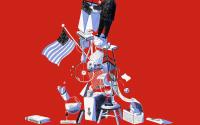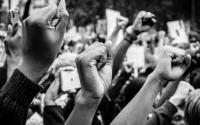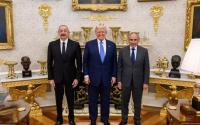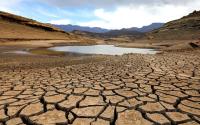Saturday 15 July 200Exodus from Beirut as Israel tightens vice and vows to disarm Hizbullah.
The three Syrian guest-workers arrived before dawn yesterday, as they did every morning, to set up their coffee stall beneath the flyover, hoping to catch the breakfast trade from early risers in the southern suburbs of Beirut. That was when the bomb blew them away, along with a large section of the road above their heads. Nobody seemed to remember their names: they were just Syrians.
Kaseem Moqdad, who lives nearby, had woken in darkness to the sound of jets overhead. By the time the overpass was bombed he was out in the street in a crowd of people, looking up at the sky. In addition to those killed, he said, 20 people were injured by flying glass and rubble.
A former corporal in the Royal Fusiliers, Mr Moqdad had been back in his native Lebanon for only a year and a half, and Israel's assault on its capital left him with a sense of torn loyalties. "I don't like Hizbullah and I don't hate Hizbullah," he said, in an accent that was half Lebanese, half north London. "We have to fix why people get mad, and we're not treating the cause." He was proud to be British, he said. "But you do get angry with the west. The Israelis don't see that they kill children and women and innocent people."
The Israeli rockets and bombs that struck southern Beirut yesterday appear to have hit their intended targets, mainly roads. One landed in the middle of a crossroads, blasting a huge crater and thrusting twisted underground pipework up into the air. Most of the roads in question, though, are yards away from shops and homes. In the Shia neighbourhoods where the damage was worst some residents sought to salvage what they could, while others just gaped, looking shellshocked.
"I thought they might hit [the Hizbullah TV station] al-Manar," said Ahmad, a barber, standing amid broken glass and torn metal in his shop. "I didn't think they would hit people's homes."
Late in the day al-Manar reported that Israeli warplanes had destroyed the building housing the headquarters of Hizbullah guerrillas in south Beirut.
A mass exodus from the capital, mainly of young families, was gathering pace, but the options for escape from Lebanon were evaporating. Three days of Israeli attacks have left the capital's airport bombed and shut down, its sea routes blockaded by warships, and the main highway into Syria impassable. Air attacks have left 53 people dead so far, as part of an Israeli campaign to win the release of two soldiers captured by Hizbullah militants in cross-border raids on Wednesday. Hizbullah's counter-assault continued yesterday, with dozens of rockets reaching into northern Israel, and deep into the Israeli psyche.
Civil War Reminder
On both sides of the border the crisis that has engulfed the region in recent days has fuelled a powerful sense of deja vu. For the Beirut residents who spent the day frantically hoarding food, candles, batteries and petrol, the atmosphere recalled the nation's 15-year civil war, and the 18-year Israeli occupation they thought had ended forever in 2000. For some in Israel the closer historical parallel was with the run-up to the war of 1967, and the prospect of direct military conflict between Israel and neighbouring states - although some diplomats have voiced the view that the current actions are restrained compared with some Israeli military operations, for example in the 1982 war.
For most of the day roads across northern Israel were empty, most people apparently obeying official instructions to stay inside. Many of the houses and apartment blocks have underground bunkers used in past conflicts.
In mid-afternoon, in the almost-deserted centre of Nahariya in northern Israel, a Hizbullah rocket landed in the middle of a normally busy avenue, shattering windows in a shopping centre.
"We will continue suffering like this until the military makes them stop," said David Shevli, 32, who had closed his grocery store on Thursday and spent yesterday fielding calls on his mobile from worried friends. "We hope they will terminate them. People who criticise our attacks on Lebanon should come and live here themselves at a time like this. Then they will see." He added: "There will be no peace as long as Hizbullah is there on the border. They say they want Jerusalem. Then they will take Haifa. Give them a finger and they'll take your whole body. Let's erase Hizbullah and everything connected to them."
Israel is still reeling from the double assault on its military prestige by separate attacks from Hizbullah and Hamas, which captured an Israeli soldier, Gilad Shalit, a month ago. Not only was the strongest army in the Middle East taken by surprise, but its assailants managed, through capturing soldiers, to prolong the pain.
Most Israelis could ignore the rocket attacks on Sderot and the farming communities that surround the Gaza strip. The bombardment of northern Israel, home to around 300,000 people, is physically much further from Tel Aviv than is Sderot, but psychologically much closer. Most Israelis have visited Haifa, or holidayed in Galilee.
While there is little criticism in the media or on the street of Israel's attacks across the border, under the surface there are fears that Lebanon, which dominated Israeli politics from 1982 to 2000, could again become a graveyard for its soldiers.
"This reminds me of a period before the 1967 war that was also characterised by mutual humiliations," said the Israeli historian Tom Segev. "From a military point of view the abduction of the soldiers should not have happened, but instead of admitting this the army uses it as a pretext to destroy the delicate political balance that exists in Lebanon ... [Hizbullah leader Hassan] Nasrallah is a nasty guy. He's a bit like Saddam. So it's similar to the Iraq situation. We find it easier to relate to war in Lebanon than in Gaza."
Condemnation
The international response to the situation in Lebanon has been broadly condemnatory of Israel, but the US has given cautious backing to the attacks, and the issue seems likely to dominate the G8 summit in St Petersburg, starting today. In New York the UN security council was also expected to discuss the emergency, following an appeal from Lebanon's prime minister, Fouad Sinoria, for the world body to intervene. Kofi Annan, the secretary general, has dispatched a three-person delegation to the region, and the EU's foreign policy chief, Javier Solana, was expected to follow soon.
But the immediate and longer term impact of the crisis will be measured inside Lebanon. As President George Bush cautioned on Thursday, the military attacks could destabilise the Beirut government and tear apart a fragile society made up of Shia and Sunni Muslims, Christians, and Druze. Just as problematically, it could also unite the population behind Hizbullah.
In Lebanon, unlike Israel, Hizbullah cannot be dismissed simply as a terrorist organisation. It is part of the national political fabric. It holds two seats in the coalition government, and essentially controls a swath of the south of the country.
If Israel's aim is to drive a wedge between Hizbullah and the rest of Lebanon there are signs it may not be succeeding. The patriotic music now playing on some of the Christian channels is one indication of the way the wind is blowing. Initial anger at Hizbullah's behaviour has become more muted as attention focuses on the severity of the Israeli bombardment.
Israel's attempt to hold the Lebanese government responsible has also caused resentment. In remarks quoted by the Beirut Daily Star yesterday, the Druze leader, Walid Jumblatt, condemned "the use of violence against a state that did not wage war and does not assume the responsibility for it".
In Beirut on Friday Amal, a woman seeing off relatives on a specially chartered coach to Syria, said she was not a Hizbullah supporter, but did not blame them for the current tragic turn of events. "They've been killing people in Gaza without anybody even raising a voice," she said. "That's why I don't see that Hizbullah is doing something wrong."
Asked if the Lebanese government should hand Mr Nasrallah to Israel, her nephew Salah chipped in: "Nasrallah is like your annoying little brother. It is right to punish him, but he's still part of the household."
Israel says its air and sea blockade of the country is, in part, an attempt to stop the captured soldiers being moved to Iran, a plan for which the Israeli government had "concrete evidence", according to a spokesman, Gideon Meir. The prime minister, Ehud Olmert, stepped up his rhetoric against Hizbullah yesterday, vowing not to end the offensive until Hizbullah was disarmed. Roni Bar-on, the interior minister, said Mr Nasrallah had "issued his own sentence. I doubt if he would be able to find a life insurance agent these days".
The scale of the operation may also be an attempt by Mr Olmert and his defence minister, Amir Peretz, to establish military credibility in the eyes of the Palestinians and other states in the region: neither man has a long track record of military experience, and neither has been in power for more than a few months.
"I believe the current [Israeli] government will see this through, not because they are strong but because they are weak," said Israel Harel, a settler leader. "Neither the prime minister nor the defence minister has a security background, and the army has made tactical mistakes. Therefore, they all have to prove that they can do what previous governments, who were led by stronger personalities such as Ariel Sharon and Ehud Barak, can do ... on the surface this is all about freeing captured soldiers. But underneath it is about the prime minister ensuring that he can carry out the next phase of disengagement."
Whatever the logic of the attack, it was playing itself out with painful repercussions yesterday in, among other places, the now inaccessible Lebanese coastal village of Doueir. Israeli planes had been dropping leaflets in Hizbullah strongholds warning residents to evacuate.
"There are air raids all over," said Ahmed Ali, Doueir's supervisor of civil defence. A family with 10 children died just outside the village when missiles hit their home on Thursday night, he said. "Now, in Yater village, there has been a similar attack," Mr Ali said. "We don't know the casualties, because the bodies are still under the rubble."
Not many miles away, at an agricultural community in northern Israel, Amit Bar-on, a computer systems engineer, stood watching smoke from Hizbullah rockets rise into the sky. "It is a very bad situation that Israel has got into," he said. "We don't have a problem with Lebanese society, most of the Lebanese are good Christian people. We have a problem with Hizbullah. We got out of Lebanon six years ago and that was a good strategy. We thought there might be peace, not immediately but perhaps in 20 or 30 years. Now we don't see peace at all."
Latest Developments: The Israeli prime minister, Ehud Olmert, yesterday warned that Israel would not halt its attacks until the Hizbullah militia was destroyed
The death toll in Lebanon reached 66, nearly all of them civilians Sixty rockets were fired into northern Israel. An Israeli woman and a child were killed in the Mount Meron area when a rocket slammed into a house Israeli jets last night attacked the home and headquarters of Hizbullah leader Sheik Hassan Nasrallah in what appeared to be a direct assassination attempt. A statement from the group said he had escaped unharmed For the first time Israel struck targets in residential areas of Beirut, bombing the capital's overcrowded southern suburbs, a Hizbullah stronghold The UN security council met last night to discuss the crisis and a three-strong team was sent to the area to try to mediate There was a wave of international condemnation for Israel's actions. George Bush said he would press Israel to spare innocent lives but said he supported its right of self-defence





